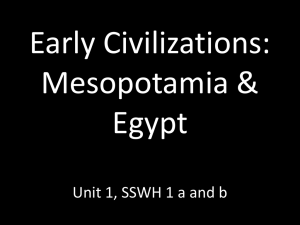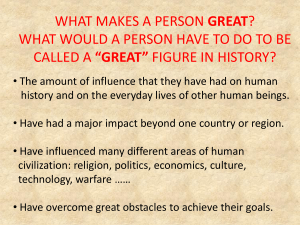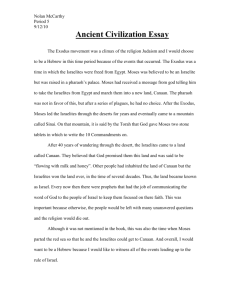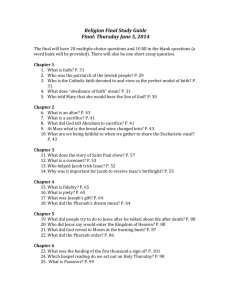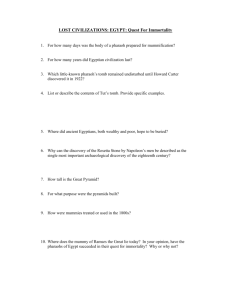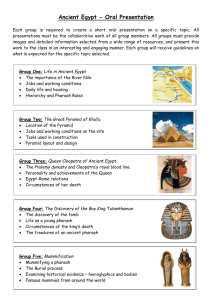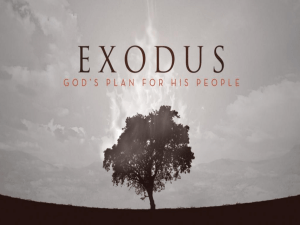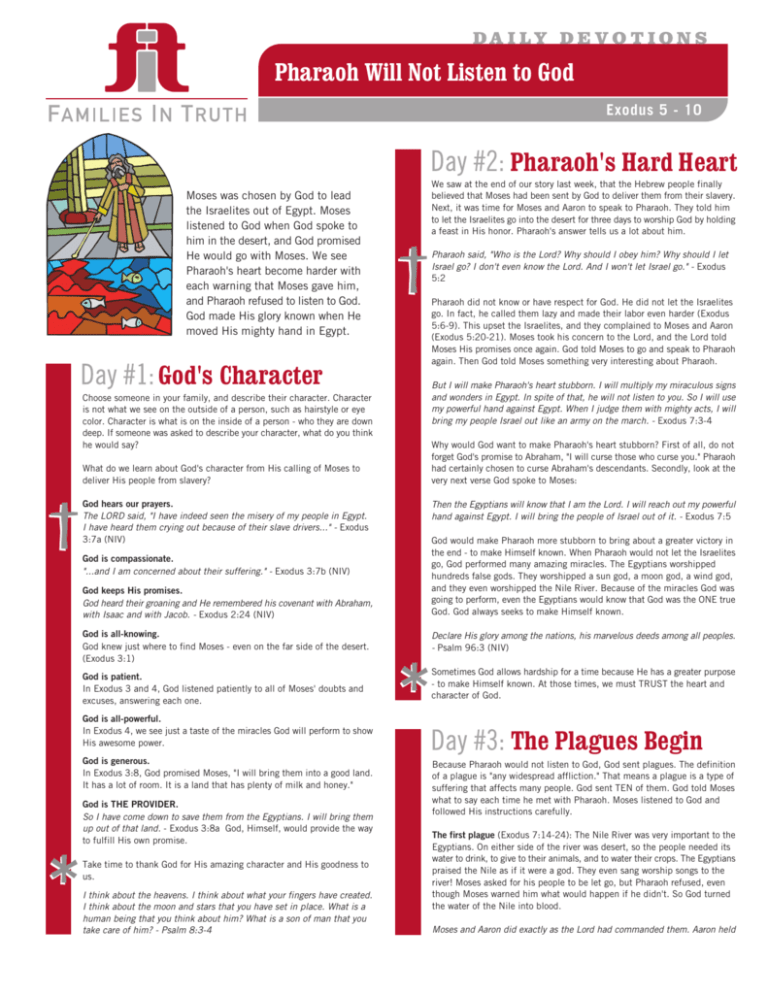
Pharaoh Will Not Listen to God
Exodus 5 - 10
Pharaoh's Hard Heart
Moses was chosen by God to lead
the Israelites out of Egypt. Moses
listened to God when God spoke to
him in the desert, and God promised
He would go with Moses. We see
Pharaoh's heart become harder with
each warning that Moses gave him,
and Pharaoh refused to listen to God.
God made His glory known when He
moved His mighty hand in Egypt.
God's Character
Choose someone in your family, and describe their character. Character
is not what we see on the outside of a person, such as hairstyle or eye
color. Character is what is on the inside of a person - who they are down
deep. If someone was asked to describe your character, what do you think
he would say?
What do we learn about God's character from His calling of Moses to
deliver His people from slavery?
God hears our prayers.
The LORD said, "I have indeed seen the misery of my people in Egypt.
I have heard them crying out because of their slave drivers..." - Exodus
3:7a (NIV)
God is compassionate.
"...and I am concerned about their suffering." - Exodus 3:7b (NIV)
God keeps His promises.
God heard their groaning and He remembered his covenant with Abraham,
with Isaac and with Jacob. - Exodus 2:24 (NIV)
God is all-knowing.
God knew just where to find Moses - even on the far side of the desert.
(Exodus 3:1)
God is patient.
In Exodus 3 and 4, God listened patiently to all of Moses' doubts and
excuses, answering each one.
God is all-powerful.
In Exodus 4, we see just a taste of the miracles God will perform to show
His awesome power.
God is generous.
In Exodus 3:8, God promised Moses, "I will bring them into a good land.
It has a lot of room. It is a land that has plenty of milk and honey."
God is THE PROVIDER.
So I have come down to save them from the Egyptians. I will bring them
up out of that land. - Exodus 3:8a God, Himself, would provide the way
to fulfill His own promise.
Take time to thank God for His amazing character and His goodness to
us.
I think about the heavens. I think about what your fingers have created.
I think about the moon and stars that you have set in place. What is a
human being that you think about him? What is a son of man that you
take care of him? - Psalm 8:3-4
We saw at the end of our story last week, that the Hebrew people finally
believed that Moses had been sent by God to deliver them from their slavery.
Next, it was time for Moses and Aaron to speak to Pharaoh. They told him
to let the Israelites go into the desert for three days to worship God by holding
a feast in His honor. Pharaoh's answer tells us a lot about him.
Pharaoh said, "Who is the Lord? Why should I obey him? Why should I let
Israel go? I don't even know the Lord. And I won't let Israel go." - Exodus
5:2
Pharaoh did not know or have respect for God. He did not let the Israelites
go. In fact, he called them lazy and made their labor even harder (Exodus
5:6-9). This upset the Israelites, and they complained to Moses and Aaron
(Exodus 5:20-21). Moses took his concern to the Lord, and the Lord told
Moses His promises once again. God told Moses to go and speak to Pharaoh
again. Then God told Moses something very interesting about Pharaoh.
But I will make Pharaoh's heart stubborn. I will multiply my miraculous signs
and wonders in Egypt. In spite of that, he will not listen to you. So I will use
my powerful hand against Egypt. When I judge them with mighty acts, I will
bring my people Israel out like an army on the march. - Exodus 7:3-4
Why would God want to make Pharaoh's heart stubborn? First of all, do not
forget God's promise to Abraham, "I will curse those who curse you." Pharaoh
had certainly chosen to curse Abraham's descendants. Secondly, look at the
very next verse God spoke to Moses:
Then the Egyptians will know that I am the Lord. I will reach out my powerful
hand against Egypt. I will bring the people of Israel out of it. - Exodus 7:5
God would make Pharaoh more stubborn to bring about a greater victory in
the end - to make Himself known. When Pharaoh would not let the Israelites
go, God performed many amazing miracles. The Egyptians worshipped
hundreds false gods. They worshipped a sun god, a moon god, a wind god,
and they even worshipped the Nile River. Because of the miracles God was
going to perform, even the Egyptians would know that God was the ONE true
God. God always seeks to make Himself known.
Declare His glory among the nations, his marvelous deeds among all peoples.
- Psalm 96:3 (NIV)
Sometimes God allows hardship for a time because He has a greater purpose
- to make Himself known. At those times, we must TRUST the heart and
character of God.
The Plagues Begin
Because Pharaoh would not listen to God, God sent plagues. The definition
of a plague is "any widespread affliction." That means a plague is a type of
suffering that affects many people. God sent TEN of them. God told Moses
what to say each time he met with Pharaoh. Moses listened to God and
followed His instructions carefully.
The first plague (Exodus 7:14-24): The Nile River was very important to the
Egyptians. On either side of the river was desert, so the people needed its
water to drink, to give to their animals, and to water their crops. The Egyptians
praised the Nile as if it were a god. They even sang worship songs to the
river! Moses asked for his people to be let go, but Pharaoh refused, even
though Moses warned him what would happen if he didn't. So God turned
the water of the Nile into blood.
Moses and Aaron did exactly as the Lord had commanded them. Aaron held
Day #3 continued:
Day #4 continued:
out his staff in front of Pharaoh and his officials. He struck the water of the
Nile River. And all of the water turned into blood. The fish in the Nile died.
The river smelled so bad the Egyptians couldn't drink its water. There was
blood everywhere in Egypt. - Exodus 7:20-21
to help themselves. The plague came and all the Egyptian animals were
killed.
God showed the Egyptians that He created the Nile that sustained them, and
He could take it away.
The second plague (Exodus 8:1-15): The Egyptians worshipped a goddess
that was said to look like a woman with the head of a frog. They believed that
she breathed life into people. So frogs were not allowed to be killed in Egypt.
Seven days after God turned the Nile to blood, God sent Moses to warn
Pharaoh again. Pharaoh still refused to let the Israelites go. This time God
sent frogs. He sent lots and lots of frogs! They were everywhere - even in their
food. There were even frogs in Pharaoh's bed! Pharaoh told Moses and Aaron
that if they would pray to God to take the frogs away, he would let the people
go. God killed all the frogs, but Pharaoh did not let the people go.
But when Pharaoh saw that there was relief, he hardened his heart and would
not listen to Moses and Aaron, just as the Lord had said. - Exodus 8:15 (NIV)
The third plague (Exodus 8:16-19): This time without a warning, God sent
a plague of gnats. God told Moses to strike the dust of the ground with his
staff. When he did, all the dust throughout Egypt turned into annoying gnats!
They were all over the people and animals. Again, Pharaoh's heart was hard
and he wouldn't let the Israelites go.
Serious consequences come when we do not listen to God. Pharaoh passed
up the opportunity to listen to God time and time again. We will see that the
longer Pharaoh disobeyed, the more serious the consequences became.
How does God speak to you? (Bible reading, Bible teachers, our parents,
prayer) We must listen to God when He speaks. Then we will live in blessings,
not in consequences.
Pharaoh sent men to investigate and found that not even one of the animals
of the Israelites had died. Yet his heart was unyielding and he would not
let the people go. - Exodus 9:7 (NIV)
The sixth plague (Exodus 9:8-12): The next plague came without warning.
God told Moses and Aaron to take soot (black dust) from a furnace and
throw it into the air. The dust blew across the land, and festering boils
broke out on the Egyptians people and animals. These boils were inflamed
blisters that would have been intensely painful. But still, Pharaoh would
not let God's people go.
We have seen that Pharaoh's disobedience not only affected him and his
household, but thousands of other people. Sin almost always affects other
people. Discuss a time when someone else's sin affected you.
Plagues in Full Force
We have seen that Pharaoh's land was hit with various vile and disgusting
plagues. Still, Pharaoh's heart was hard and he stubbornly refused to listen
to God through Moses' warnings.
The seventh plague (Exodus 9:13-35): Once again, God told Moses to go
to Pharaoh early in the morning. This time God's warning was extremely
harsh.
Go to Pharaoh and say to him, 'The Lord, the God of the Hebrews, says,
"Let my people go. Then they will be able to worship Me. If you do not let
them go, I will send the full force of my plagues against you this time.
They will strike your officials and your people. Then you will know that
there is no one like Me in the whole earth. - Exodus 9:13b-14
This time God even explained to Pharaoh why this would happen.
Not on God's People
The Bible tells us that when God sent the first plagues, Pharaoh called in
his magicians, and they were able to do similar things. They made water
turned to blood and made more frogs appear. We are not certain whether
the things done by the magicians are actually tricks (magic illusions), or if
the magicians were given supernatural powers by Satan. Either way, what
the magicians were able to do was not nearly as powerful as what God did.
After the first two plagues, they tried, and failed, to produce gnats (Exodus
8:18). After that, they did not even try to keep up. They were never able to
undo any part of God's plagues. And in the end, they admitted the plagues
were done by the finger of God (Exodus 8:19). Just imagine, even the people
who practiced sorcery and witchcraft confessed the power of God.
The fourth plague (Exodus 8:20-32): God told Moses to go to Pharaoh early
in the morning. He was to warn Pharaoh that the next plague would be
swarms of flies everywhere. But this time, God said he would spare His
chosen people from the plague. Look closely at why God did this.
But on that day I will treat the area of Goshen differently from yours. That
is where my people live. There will not be large numbers of flies in Goshen.
Then you will know that I, the Lord, am in this land. I will treat my people
differently from yours. The miraculous sign will take place tomorrow. - Exodus
8:22
Seeking relief from the flies, Pharaoh promised to let the people go. But
once the flies were gone, he would not let the Israelites go.
The fifth plague (Exodus 9:1-7): Then God sent Moses to tell Pharaoh the
next plague would kill all the livestock of the Egyptians - horses, donkeys,
camels, cattle, sheep, and goats. But none of the Israelites' animals would
be killed. In those days, a person's wealth was determined by how much
livestock they owned. This plague would crush the Egyptian economy. Wealthy
people would instantly become poor. Animals that did work, such as pull
plows, would be gone. Animals used for food would be gone. Further more,
the Egyptians believed these animals represented some of their gods. These
animals were sacred to the Egyptians, but God proved they were powerless
But I had a special reason for making you king. I decided to show you my
power. I wanted my name to become known everywhere on earth. - Exodus
9:16
God told Pharaoh He would send the worst storm that Egypt had ever had.
He told him to order all people and animals to take cover. Everything left
outside would be destroyed. By this time, some of Pharaoh's officials
feared the word of God and they listened to Him. But some did not fear
and did not listen. Just as God said, hail, rain, and lightning poured down
on Egypt, except where the Israelites lived. Egypt was nearly destroyed.
Pharaoh promised to let the people go, but when God stopped the storm,
Pharaoh broke his promise.
The eighth plague (Exodus 10:1-20): The only crops that were not destroyed
by the storm were the wheat and spelt because they had not ripened yet.
God sent a plague of locusts. These are insects like grasshoppers or cicadas
that devour crops. The locusts were everywhere - even inside all the homes.
They wiped out everything that was not destroyed by the storm. Once more,
Pharaoh begged Moses to forgive him and ask God to stop the plague. God
shifted the wind and all the locusts were carried into the Red Sea, but
Pharaoh did not let the people go.
The ninth plague (Exodus 10:21-29): After Pharaoh refused to listen to
God again, God sent total darkness to cover Egypt for three days. There
was no moon or stars. Few of us have ever experienced darkness like this.
We must assume that even their lanterns did not work. In fact, no Egyptian
could leave his home because of the darkness. The Israelites, however,
did have light in their homes.
The tenth plague was the worst plague of all. It was the plague of death.
We will look at this plague, and God's provision for His people next week.
God went to excessive lengths to make Himself known (Exodus 9:16). In
Exodus 10:1-2 God tells Moses to tell his children and grandchildren of
the miraculous wonders He performed in Egypt. Likewise, God wants you
to tell people about the mighty works God has done in your life (Psalm
145:3-4).
© 2007 BibleLessons4Kids.com All rights reserved worldwide. May be reproduced for personal, nonprofit, and non-commercial uses only. Unless otherwise noted the Scriptures taken from:
Holy Bible, New International Reader’s Version, (NIrV®) / Copyright © 1995, 1996, 1998 by International Bible Society / Used by permission of IBS-STL. All rights reserved worldwide.


